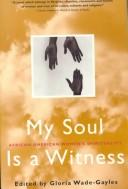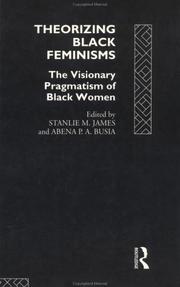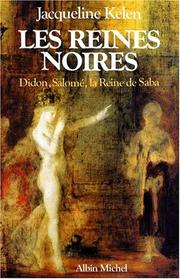| Listing 1 - 10 of 100 | << page >> |
Sort by
|

ISBN: 0807009342 Year: 1995 Publisher: Boston, MA : Beacon Press,
Abstract | Keywords | Export | Availability | Bookmark
 Loading...
Loading...Choose an application
- Reference Manager
- EndNote
- RefWorks (Direct export to RefWorks)
CULTURE --- U.S. --- BLACK WOMEN --- BAKER (ELLA JO) --- U.S. --- CULTURE --- U.S. --- BLACK WOMEN --- BAKER (ELLA JO) --- U.S. --- BLACK WOMEN
Book
ISBN: 8395609558 839560954X Year: 2019 Publisher: De Gruyter
Abstract | Keywords | Export | Availability | Bookmark
 Loading...
Loading...Choose an application
- Reference Manager
- EndNote
- RefWorks (Direct export to RefWorks)
This study examines the Black Women's Renaissance (BWR) - the flowering of literary talent among African American women at the end of the 20th century. It focuses on the historical and heritage novels of the 1980s and the vexed relationship between black cultural nationalism and black feminism. It argues that when the nation seemingly fell out of fashion, black women writers sought to re-create what Renan called "a soul, a spiritual principle" for their ethnic group. BWR narratives, especially those associated with womanism, appreciated "culture bearing" mothers as cultural reproducers of the nation and transmitters of its values. In this way, the writers of the BWR gave rise to "matrifocal" cultural nationalism that superseded masculine cultural nationalism of the previous decade and made black women, instead of black men, principal agents/carriers of national identity. This monograph argues that even though matrifocal nationalism empowered women, ultimately it was a flawed project. It promoted gender and cultural essentialism, i.e. it glorified black motherhood and mother-daughter bonding and condemned other, more radical models of black female subjectivity. Moreover, the BWR, vivified by middle-class and educated black women, turned readers' attention from more contentious social issues, such as class mobility or wealth redistribution. The monograph compares the cultural nationalist novels of the 1980s with social protest novels written by the same authors in the 1970s and explains the rationale behind the change in their aesthetic and political agenda. It also contrasts novels written by womanist writers (Toni Morrison, Alice Walker, Gloria Naylor to name just a few) and by African Caribbean immigrant or second-generation writers (Audre Lorde, Paule Marshall, Jamaica Kincaid and Michelle Cliff) to show that, on the score of cultural nationalism, the BWR was not a monolithic phenomenon. African American and African Caribbean women writers collectively contributed to the flourishing of the BWR, but they did not share the same ideas on black identities, histories, or the question of ethnonational belonging.

ISBN: 0415073367 0415073375 Year: 1993 Publisher: London Routledge
Abstract | Keywords | Export | Availability | Bookmark
 Loading...
Loading...Choose an application
- Reference Manager
- EndNote
- RefWorks (Direct export to RefWorks)
Philosophical anthropology --- Sociology of minorities --- Afro-american women --- Black women --- Feminism --- Feminist theory
Book
ISBN: 1438470959 9781438470955 9781438470931 1438470932 Year: 2018 Publisher: Albany
Abstract | Keywords | Export | Availability | Bookmark
 Loading...
Loading...Choose an application
- Reference Manager
- EndNote
- RefWorks (Direct export to RefWorks)
This book explores how Diasporic Black women engage in politics, highlighting three dimensions—citizenship, power, and justice—that are foundational to intersectionality theory and politics as developed by Black women and other women of color. By extending beyond particular time periods, locations, and singular definitions of politics, Black Women in Politics sets itself apart in the field of women's and gender studies in three ways: by focusing on contemporary Black politics not only in the United States, but also the African Diaspora; by showcasing politics along a broad trajectory, including social movements, formal politics, public policy, media studies, and epistemology; and by including a multidisciplinary range of scholars, with a strong concentration of work by political scientists, a group whose work is often excluded or limited in edited collections. The final result expands our repertoire of methodological tools and concepts for discussing and assessing Black women's lives, the conditions under which they live, their labor, and the politics they enact to improve their circumstances.
Women, Black --- Feminism --- Black women --- Women, Negro --- Political activity --- Social conditions

ISBN: 2226029907 Year: 1987 Publisher: Paris : Albin Michel,
Abstract | Keywords | Export | Availability | Bookmark
 Loading...
Loading...Choose an application
- Reference Manager
- EndNote
- RefWorks (Direct export to RefWorks)
REINES --- BLACK WOMEN --- DIDO (LEGENDARY CHARACTER) IN LITERATURE --- SALOME --- SABA --- AFRIQUE --- AFRICA --- QUEENS
Book
ISBN: 086975243X Year: 1985 Publisher: Johannesburg Ravan Press
Abstract | Keywords | Export | Availability | Bookmark
 Loading...
Loading...Choose an application
- Reference Manager
- EndNote
- RefWorks (Direct export to RefWorks)
Women, Black --- Women household employees --- Housemaids --- Maids, House --- Women domestics --- Women servants --- Household employees --- Black women --- Women, Negro
Book
ISBN: 9780674258808 0674258819 0674258800 Year: 2021 Publisher: Cambridge, MA
Abstract | Keywords | Export | Availability | Bookmark
 Loading...
Loading...Choose an application
- Reference Manager
- EndNote
- RefWorks (Direct export to RefWorks)
"Daphne A. Brooks explores more than a century of music archives to examine the critics, collectors, and listeners who have determined perceptions of African American women on stage and in the recording studio. Liner Notes for the Revolution offers a startling new perspective on these acclaimed figures-a perspective informed by the overlooked contributions of other black women concerned with the work of their musical peers. Zora Neale Hurston appears as a sound archivist and a performer, Lorraine Hansberry as a queer black feminist critic of modern culture, and Pauline Hopkins as America's first black female cultural intellectual. Brooks tackles the complicated racial politics of blues music recording, collecting, and rock and roll music criticism. She makes lyrical forays into the blues pioneers Bessie Smith and Mamie Smith, as well as fans who became critics, like the record-label entrepreneur and writer Rosetta Reitz. In the twenty-first century, pop superstar Janelle Monae's liner notes are recognized for their innovations, while celebrated singers Cecile McLorin Salvant, Rhiannon Giddens, and Valerie June take their place as serious cultural historians. Above all, Liner Notes for the Revolution reads black female musicians and entertainers as intellectuals. At stake is the question of who gets to tell the story of black women in popular music and how"--
African American women musicians. --- African American women --- Musical criticism --- African American feminists. --- Feminists, African American --- Feminists --- Hermeneutics (Music) --- Music criticism --- Journalism --- Music --- Afro-American women --- Women, African American --- Women, Negro --- Women --- Afro-American women musicians --- Women musicians, African American --- Women musicians --- History and criticism. --- History. --- History and criticism --- African American/Black Women’s History. --- Black Feminist Theory. --- Black Women. --- Black Women’s intellectual history. --- Black feminist performance. --- Black women vocalists. --- Blues history. --- Music Criticism. --- Popular Music Culture. --- Queer Theory. --- Zora Neale Hurston.
Book
ISBN: 197881335X 1978813376 1978813333 1978813341 Year: 2022 Publisher: New Brunswick : Rutgers University Press,
Abstract | Keywords | Export | Availability | Bookmark
 Loading...
Loading...Choose an application
- Reference Manager
- EndNote
- RefWorks (Direct export to RefWorks)
"Black women have long recognized the power of film for storytelling. For far too long, however, the cultural and historical narratives about film have not accounted for the contributions of Black women directors. This book remedies this omission by highlighting the trajectory of the culturally significant work of Black women directors in the U.S., from the under-examined pioneers of the silent era, to the documentarians who sought to highlight the voices and struggles of Black women, and the contemporary Black women directors in Hollywood. Applying a Black feminist perspective, this book examines the ways that Black women filmmakers have made a way for themselves and their work by resisting the dominant cultural expectations for Black women and for the medium of film, as a whole"--
Cinema --- Productrices et realisatrices de cinema noires americaines --- Motion picture industry --- Motion pictures --- African American women motion picture producers and directors --- Histoire. --- History. --- United States. --- Black women, Black women directors, American film studies, African American directors, L.A. rebellion, mainstream media, black women movies, black narratives, African American women, African American studies, African American filmography, female directors, black feminism, gender studies, film, filmmaking, movie, directing, film studies.
Book
ISBN: 9789082357509 Year: 2015 Publisher: Place of publication unknown Stijn Vanwijnsberghe
Abstract | Keywords | Export | Availability | Bookmark
 Loading...
Loading...Choose an application
- Reference Manager
- EndNote
- RefWorks (Direct export to RefWorks)
sculpting --- women [female humans] --- black women --- painting [image-making] --- Art --- African cultural and regional styles : general distribution --- Jespers, Floris --- African by general distribution --- Exhibitions --- Catalogs --- sculpture [visual works]

ISBN: 1859726437 Year: 1997 Publisher: Aldershot Ashgate
Abstract | Keywords | Export | Availability | Bookmark
 Loading...
Loading...Choose an application
- Reference Manager
- EndNote
- RefWorks (Direct export to RefWorks)
| Listing 1 - 10 of 100 | << page >> |
Sort by
|

 Search
Search Feedback
Feedback About UniCat
About UniCat  Help
Help News
News